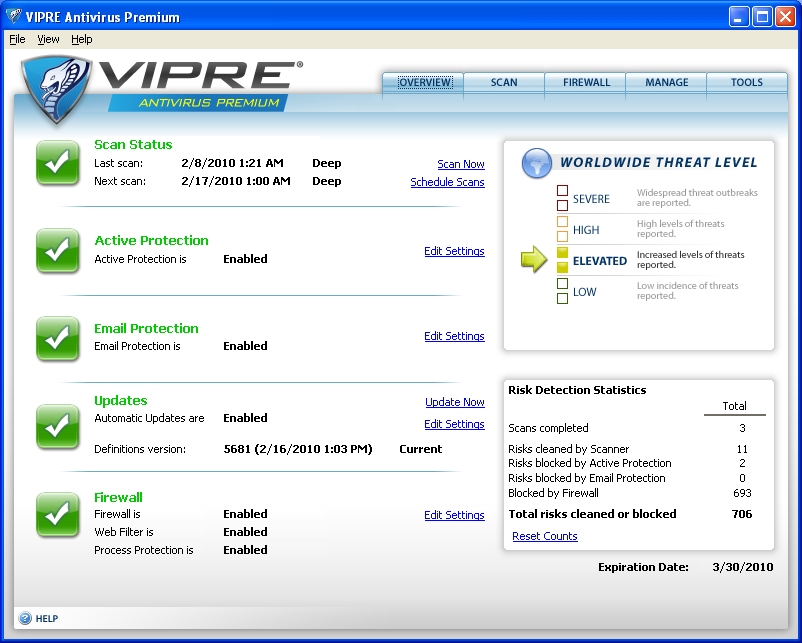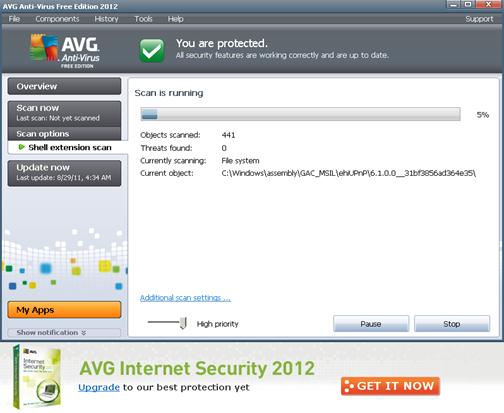Do Antivirus Suites Impact Your PC's Performance?
Most of us are now fairly confident that our antivirus scanners are doing their main job of protecting our systems from malicious pests. But what are those scanners doing to system performance behind the scenes? Are some scanners better than others?
Do Antivirus Suites Have A Big Impact On Performance?
We’ve hit the highlights in terms of time and system performance considerations here, although there are a few loose ends. For instance, AV product installation could be an issue. Most products install fairly quickly and smoothly, but some may be less intuitive than others in guiding you through an initial definitions update.
For instance, initial setup with GFI Vipre was slightly unusual. The program installed normally and requested a reboot, which we did. Upon resuming, Vipre did its usual thing and had us download a definition update, which took about three minutes or so and requested another reboot. However, upon our next return to the application, the main UI still showed that Active Protection was not enabled, even though it looked to be so in the options, and we appeared to have still not implemented a definition update. So we polled for new definitions again, and this time the download took over 20 minutes on our 15 Mb/s FiOS downlink. But once obtained, the new definitions installed quickly and resulted in both the Updates and Active Protection icons changing to green check marks. Good to go.

Another potential time sink comes after the scan when you assess results. Symantec excels at finding tracking cookies, regardless of whether you consider these important (the program’s options will let you filter out certain threat types, if you’re really annoyed). Our initial scan found 22 tracking cookies while, for example, McAfee found four. Do we care? Not really, and we’d rather not have to consider if the “threat” is worth worrying about. We use AV products in part to make such decisions for us.
As for impact on CPU utilization, all products seem to be fairly even, falling in the 4% to 11% range. We found that McAfee edged a bit higher, trending in the 10% to 15% range, which could explain some of the company’s lower scanning times, although we’re still baffled by that first deep scan score. One likely reason why AVG performs so quickly in scanning is that it will ratchet into high priority mode when your system goes idle. When you return, the app reverts to low priority mode.

In retrospect, we have to wonder if it was a mistake to run these tests on a modern quad-core processor (Core i7-2600K). In reality, the CPU is so fast that it’s hard to register a significant load from even the most demanding AV apps. In our opinion, that’s the big message of this article. We’ve seen some AV companies trumpet CPU utilization scores showing how much less impact their product has than others. Apparently, this is somewhat like saying you can boil water at 230 degrees Fahrenheit instead of 260 degrees. As long as the water is at 212 degrees or higher, no one really cares. What might have once been a serious concern in the single-core days, or even still on low-end, low-power processors, is no longer a worry on modern platforms. The load from any of these AV products is negligible with such horsepower under the hood.
On that basis, we conclude that, in most cases, performance may be a secondary concern when selecting an antivirus product, but it shouldn’t be one of your first criteria.
Enter to Win a Tom's Enthusiast PC with Vipre Antivirus here.
Get Tom's Hardware's best news and in-depth reviews, straight to your inbox.
Current page: Do Antivirus Suites Have A Big Impact On Performance?
Prev Page Scanning Time-
dogman_1234 Regardless what anyone says: Using McAfee is like using a Glad garbage bag as a condom.Reply -
Martell77 I've been using Trend Micros AV since y2k and haven't had a reason to switch. Because of the systems my clients have I never recommend Norton or McAfee and if they have it I always recemmend they switch. Its truely amazing how the performance of their systems increases after getting rid of those AVs, especially Norton.Reply -
soccerdocks On the scanning time page there is an error in the second graph. It also says first run.Reply
Also, the timing of this article was excellent. I had just been doing some research about what anti-virus software I should switch to, mainly based on performance, but I guess I just got all the information I needed. -
compton Some of the results seem mysterious, like all the times the no-AV configuration scored lower in many tests than it should be faster in. Is it possible that using the Wildfire as the system drive instead of the platter would have eliminated this behavior? In general, I hope there is a second part to this that does include SSD runs. I would think any advantage AV products have vs. the no-AV config would evaporate.Reply
I stopped using AV products on my personal systems back in 2003. Norton back then was god-awful on a Pentium 4 systems, seemingly crushing the life out of a system. Even with a first generation WD Raptor 36GB my P4 2.6 would choke not only with Norton, but also McAfee. I might not use AV software, but I do put it on my family members' systems when it doesn't kill performance. In that respect these modern solutions seem much better.
-
ChiefTexas_82 On my Pentium D I have to run McAfee when I'm gone for a good while or sleeping as my computer slows to a crawl during the scan. Even bringing up the menus to stop the scan take way too long.Reply -
darkstar845 Why didn't they test this on a computer with average specs? The 8gb ram and very fast CPU might be offsetting the impact that the AVs put on the computer.Reply -
bit_user Thanks for this. I remember the bad old days when AV could make software builds take several times longer.Reply
-
cdhollan While my comment is completely tangential, but my inner chemical engineer can't resist making a small correction in what is otherwise a great article:Reply
>>Apparently, this is somewhat like saying you can boil water at 230 degrees Fahrenheit instead of 260 degrees. As long as the water is at 212 degrees or higher, no one really cares. -
rottingsheep installing vipre speeds up your computer?Reply
i think something is wrong with your numbers. -
Amazed ESET is not being tested considering it sells itself on its performance over the competition while maintaining the same levels of protection.....Reply